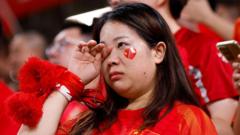On a steamy night in Saitama, China’s dream of football glory hit rock bottom as its national team suffered a crushing 7-0 defeat against Japan. This was not just another loss; it became a defining moment in a series of humiliating performances, including defeats to Oman and Hong Kong. As if that wasn’t enough, just seven days later, a massive corruption probe led to the arrest of players and officials for gambling and match-fixing, further tarnishing the already beleaguered image of Chinese football.
Once, China aspired to become a footballing giant, backed by its massive population and a fervent political will from President Xi Jinping. His vision included qualifying for the World Cup, hosting it, and eventually winning it. However, a decade later, his enthusiasm seems to have waned. He was heard remarking on "getting lucky" after a recent win, indicating a loss of confidence in a once-promising future.
Experts argue that China's centralized governance hampers sports development, stymying grassroots initiatives and leading to political appointments rather than decisions made by football experts. Unlike successful footballing nations that fostered grassroots movements over decades, China’s efforts have been top-down, resulting in an unbalanced system where over a million registered players in England outnumber China’s fewer than 100,000.
Despite the setbacks for men’s football, the women’s national team remains a point of pride, ranked 17th in the world and attracting record viewership. However, the men’s league grapples with financial woes, seeing many teams fold since the onset of the COVID-19 pandemic, including historic clubs like Jiangsu FC and Guangzhou Evergrande.
The emergence of corruption scandals culminated in high-profile arrests, revealing a culture of bribery that has shocked fans. The lack of a solid developmental framework, alongside political interference, has made it difficult for young talent to cultivate their skills naturally, resulting in a lack of "football IQ" among Chinese players.
As the economy slows and focuses shift to more lucrative individual sports, the future of football in China grows dimmer. Fans have been left disappointed, recently joking about the team's consistency in failing to meet expectations. Critics warn that without systemic changes, China may never rise to the footballing heights it so passionately dreams of achieving.






















